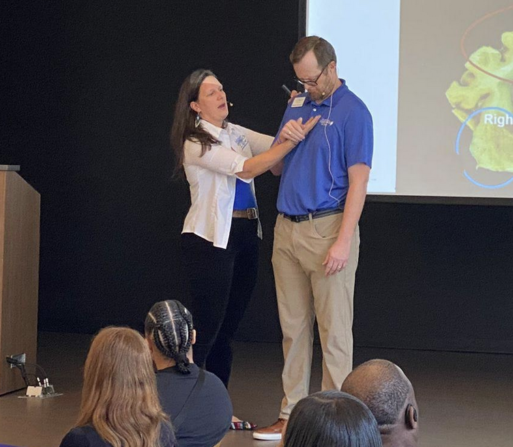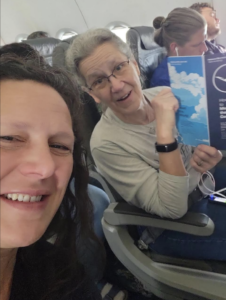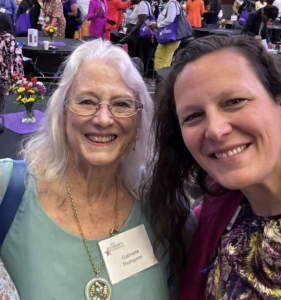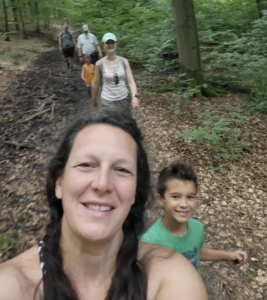
Amanda Bulgarelli instructing at a Positive Approach to Care training
Amanda Bulgarelli is the COO of Positive Approach to Care, a company that aims to destigmatize dementia through the education and training of caretakers, medical professionals and those living with dementia. Founded in 2007 by her mother, Teepa Snow, a dementia care specialist and occupational therapist, PAC teaches practical care methods along with theory to understand changes in the brain. The company works with everyone from family-member caregivers to hospitals and academic institutions.
Editor’s note: This interview has been edited for length and readability.
What is the Positive Approach to Care and what are its specific goals?
Around 2007, Teepa Snow was an OT (occupational therapist) working in lots of different fields, mostly focusing on Alzheimer’s Association work, and was doing a lot of training and educating all over the world. Her techniques were built on the foundation of working in long-term care, hospice and the VA clinics — after years of working in head trauma she realized, oh, the approach to someone really matters. If someone is in high distress, giving them medication could make them lose capabilities, lose the abilities to be functional and independent. Whereas if you approach someone without surprising them, if you ask permission to do the things you’re trying to help them do, then you’ll be able to be a lot more successful. And, they’ll maintain their independence for longer, meaning lower care numbers needed, and a higher success rate for tasks getting done.

Bulgarelli with her mother, Teepa Snow, founder of A Positive Approach to Care
So she created A Positive Approach to Care, which is her global for-profit company that goes around and teaches people living with dementia, their care partners (whether professional or families), and medical professionals, as well as organizations. There’s not a lot of training for anybody in the field of dementia care. Truly, often the difference between assisted living and memory care — which is a poor term for dementia-specific care — means that there’s a locked door because it’s safer. And she said, “No, it should mean more training, it should mean more education, that people understand dementia.”
So she spent the last 40 years trying to radically transform the experience of dementia for everybody involved, from the tippy-top to the very bottom. We’ve got to change this culture to a more positive one to see what abilities remain, while acknowledging what’s lost.
What is your role within the company?
By trade I was an elementary school teacher; I got my administrative license and degree. Teepa Snow had started doing certification courses so others could go out and train her techniques — we had trainer, coach and consultant courses at the time. In 2015, I took one of those courses and was like, “Oh wow, this is cool. This is the way I’ve learned to teach through experiential learning.” And I realized she was doing all the legwork — she was booking flights for everybody, she was creating the manuals from her PowerPoints, which were about 300 slides long. And I said, you know what? I can create a curriculum from this. I can make this something really amazing. I can grow this curriculum and certification program. So I started there. And when I took a bigger look at the company, she also needed a COO, somebody to manage the organization, to help grow it. So that’s the role I moved into in 2015. I left elementary school behind to join a different kind of teaching.
What are some challenges that you experience in your work?
Well, I think the two biggest challenges that we experience is that dementia is not sexy. It’s not fun. Nobody wants to talk about it. Nobody wants to admit they have it. Things really get taken away from you if dementia enters your life. So the stigma and the isolation are the biggest challenge. We have only about 20% of people getting an early to mid-state diagnosis. That means most people have been living with dementia for up to 15 years. And no one is saying or doing anything about it, because it can kind of be written off as, “Oh, that’s just aging,” or “she’s just tired.”

Bulgarelli at the NC Women’s Conference
One of the biggest downfalls is that in our society or around the world — we’ve been to a lot of countries — no one’s checking on our cognitive health. No one’s getting cognitive baselines. We do it for kids as they begin school, but then we stop looking at anything other than standardized test scores, which only really measure one part of the brain. As adults, we have our blood tested, we have our heart checked; for women, we have all kinds of things monitored up there. But we’re not checking cognitive health.
We’re not talking hours of testing. I’m saying a one-minute animal fluency screening annually at your doctor, where you just list the number of animals you can think of. It’s a proven test. It measures lots of different parts of the brain. And it also measures, really importantly, language delivery and following the question, holding animals front and center. So this year, if I have 42 in a minute and next year I have 30, we don’t want to say, “Oh, that’s dementia,”but it allows my health care provider to get really curious and push for a little bit more information. But the fact is we’re just not looking at it. So that’s number one. We’re hiding from it or isolated from it.
And the second piece is nobody — and I mean nobody — in long term care, hospitals or any of these health or dementia care fields, wants to pay for training and education. It’s a missing piece. People will pay for marketing, they’ll pay for us to come in and do a speaking engagement, which is getting the community in or highlighting what great things they do. But it’s really hard for folks to find the funding, in the way the system is set up, to provide for extra training and education for the people doing this work. Health care workers who are in a dementia-specific unit, neighborhood or home are receiving up to 8 to 12 hours of “extra training.” And all of it is video. There’s no skills demonstration requirement and there is no requirement that is in-person, physical skill-related training. So they’re watching a video and now they’re qualified to go and care for a whole person’s body, who’s also now living with brain changes.
It seems so obvious when you say it — we don’t have any tests around cognitive ability. My dad had early-onset Alzheimer’s and we have no idea how many years he had been living with some form of it before it was bad enough to become an issue. That would have been such helpful information.

Bulgarelli and crew on a hiking trail
The challenge, the real devastating part is that there are things you could do — because maybe it’s not Alzheimer’s early on, maybe it’s a UTI, maybe it’s mismanagement of medications, maybe he’s taking too much or not enough. If the doctors could get more present in that, perhaps we could do a better job of treating the things that we can, instead of just looking the other way and hoping it doesn’t get so bad. And then it does. And now we have to place, because it’s no longer safe. It’s just a really broken front part of the system because there’s not enough discussion around it, nor are there enough people who are willing to take a look.
Oh, and a few years ago there was a big movement. When you go to your doctor, they’ll ask you, are you feeling blue or feeling depressed? Have you had any thoughts of self-harm? Now it’s just a 30-second checklist. And it has proven to help identify some cases of depression that you would have missed before. So one of the things we’re advocating for is shouldn’t we be doing that for our brain health? I want to know how I’m doing. But I don’t want it to be something that I have to push for.
I have one final question for you — what is one thing you wish more dementia caregivers and patients knew?
Our biggest message is that diagnosis does not mean the end. People will live anywhere from three months to 30 years with these conditions, depending on the type of dementia. And there is so much life to be lived. It does require changing what our “normal” looks like, what our new daily routine is going to look like. And we have so many people who have found value and purpose. We have volunteers here at our nonprofit that have said, “I was on the brink. I was ready to end it all because I felt like there was no hope.” And there is life. And it is worth living even when you have a condition like dementia. I think that’s our number one message.
Is there anything else you feel prompted to share?
We’re going to be making quite a lot of splashy statements — we’re doing Viewpoint with Dennis Quaid, and we’re going to be doing a PSA with somebody famous reading it. We also have a couple of new books and things coming out. Our goal is to keep building and supporting the community. So yeah — stay tuned and get invested because we’re the only ones doing it right now, and that’s sad. We could use more help with people joining our cause.

 A Dignified Approach to Dementia Care
A Dignified Approach to Dementia Care


 National Donate Life Month Reminds Us To Give
National Donate Life Month Reminds Us To Give
 How Dare You Die Now!
How Dare You Die Now!
 Debating Medical Aid in Dying
Debating Medical Aid in Dying














